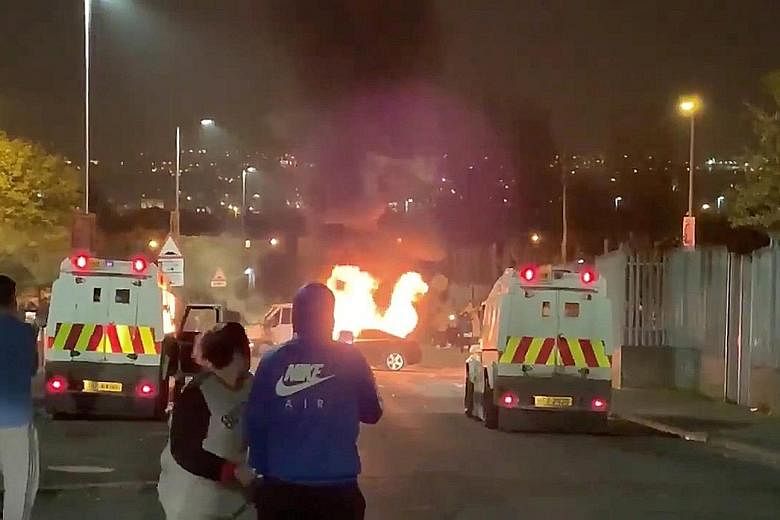BELFAST • An off-duty journalist was killed as shots were fired during rioting in the Northern Irish city of Londonderry overnight, in what police yesterday said was likely the work of militant nationalists opposed to the British region's 1998 peace deal.
Rioting erupted in the Irish nationalist Creggan area of the city late on Thursday, following a raid by police, who said they were trying to prevent militant attacks planned for the weekend.
Videos posted on social media showed police vehicles being pelted with dozens of petrol bombs, bricks, bottles and fireworks. At least 50 petrol bombs were thrown and two cars set on fire.
"Unfortunately, at 11pm last night, a gunman appeared and fired a number of shots towards the police and a young woman, Ms Lyra McKee, 29 years old, was wounded" and later died, Police Service of Northern Ireland Assistant Chief Constable Mark Hamilton told journalists yesterday.
He said police were treating the incident as a terrorist attack and had opened a murder inquiry.
"We believe this to be a terrorist act. We believe this has been carried out by violent dissident republicans," Asst Chief Constable Hamilton added, saying the New IRA group, which has been responsible for several attacks in recent years, was most likely behind the killing.
A local journalist who was at the scene, Ms Leona O'Neill, wrote on Twitter that after the woman was shot, she fell beside a police Land Rover and officers rushed her to hospital, where she died.
The violence came in the run-up to the Easter weekend, when Republicans opposed to British presence in Northern Ireland mark the anniversary of a 1916 uprising against British rule.
The detonation of a large car bomb outside a courthouse in Londonderry in January highlighted the threat still posed by militant groups opposed to the Good Friday Agreement who have previously launched attacks during the Easter period.
Politicians in Northern Ireland have also warned that Britain's plans to leave the European Union could undermine the peace deal and that any border infrastructure would become targets for militant groups.
Irish Prime Minister Leo Varadkar warned that "we cannot allow those who want to propagate violence, fear and hate to drag us back to the past".
His British counterpart Theresa May said the killing was "shocking and truly senseless". In Brussels, a European Commission spokesman condemned the "terrible incident".
The leaders of Northern Ireland's two largest political parties, the Irish nationalist Sinn Fein party and pro-British Democratic Unionist Party (DUP), both condemned the killing.
"Those who brought guns onto our streets in the 70s, 80s and 90s were wrong. It is equally wrong in 2019. No one wants to go back," DUP leader Arlene Foster said on Twitter.
Ms Michelle O'Neill, the deputy leader of Sinn Fein, wrote on Twitter: "My heart goes out to the family of the young woman shot dead by so-called dissidents."
Visiting US House of Representatives Speaker Nancy Pelosi joined in a minute's silence for Ms McKee, saying it was "especially poignant", being held on Good Friday.
Ms McKee was writing a book on the disappearance of young people during three decades of sectarian violence in Northern Ireland, which ended with the 1998 Good Friday Agreement peace deal.
She was described by publisher Faber as a rising star in investigative journalism.
Police said they did not believe she was working at the time of the attack. Before she was shot, Ms McKee had posted an image that appeared to be from the riots in the city, also known as Derry, accompanied by the words, "Derry tonight. Absolute madness".
The Good Friday Agreement in 1998 largely brought an end to three decades of sectarian bloodshed in Northern Ireland between republican and unionist paramilitaries, as well as British armed forces, in a period known as "the Troubles".
Some 3,500 people were killed in the conflict - many at the hands of the Irish Republican Army.
Londonderry was the scene of one of the darkest episodes in the Troubles in 1972, known as Bloody Sunday, when British troops opened fire on a civil rights demonstration and killed 13 people. A 14th victim later died of his wounds.
Following a long-running public inquiry in 2010, Britain's then Prime Minister David Cameron issued a formal state apology for the killings, calling them "unjustified and unjustifiable".
REUTERS, AGENCE FRANCE-PRESSE

Police raid sparks riots in Northern Ireland
A car that was set alight by a petrol bomb thrown at policemen in Londonderry, Northern Ireland, on Thursday. Rioting broke out in the city's Creggan housing estate after police conducted a raid in anticipation of militant attacks over the Easter weekend. An off-duty female journalist was killed when a gunman fired a number of shots at the police during the mayhem.

